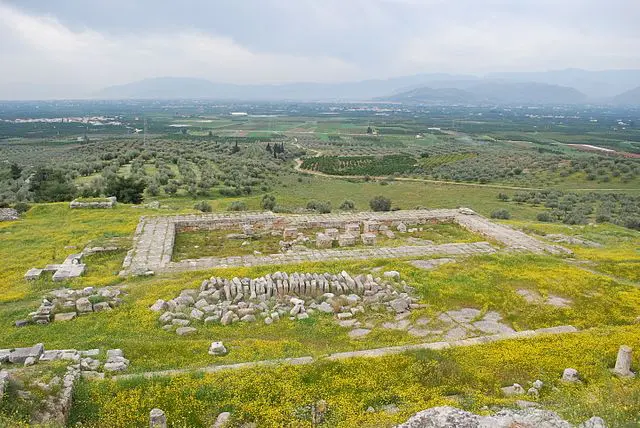Ἱστορίαι Ἡροδότου — α’
Herodotus’ Histories — #1
May 2021
View from the Heraion of Argos into the Inachos plain by Sarah Murray (CC BY-SA 2.0)

The first chapter begins with a short introduction to his work and begins the retelling of the story of the kidnapping of the royal daughter Io by the Phoenicians.
Ἡροδότου Ἁλικαρνησσέος ἱστορίης ἀπόδεξις ἥδε, ὡς μήτε τὰ γενόμενα ἐξ ἀνθρώπων τῷ χρόνῳ ἐξίτηλα γένηται, μήτε ἔργα μεγάλα τε καὶ θωμαστά, τὰ μὲν Ἕλλησι τὰ δὲ βαρβάροισι ἀποδεχθέντα, ἀκλεᾶ γένηται, τά τε ἄλλα καὶ δι᾽ ἣν αἰτίην ἐπολέμησαν ἀλλήλοισι.
Περσέων μέν νυν οἱ λόγιοι Φοίνικας αἰτίους φασὶ γενέσθαι τῆς διαφορῆς. τούτους γὰρ ἀπὸ τῆς Ἐρυθρῆς καλεομένης θαλάσσης ἀπικομένους ἐπὶ τήνδε τὴν θάλασσαν, καὶ οἰκήσαντας τοῦτον τὸν χῶρον τὸν καὶ νῦν οἰκέουσι, αὐτίκα ναυτιλίῃσι μακρῇσι ἐπιθέσθαι, ἀπαγινέοντας δὲ φορτία Αἰγύπτιά τε καὶ Ἀσσύρια τῇ τε ἄλλῃ ἐσαπικνέεσθαι καὶ δὴ καὶ ἐς Ἄργος. τὸ δὲ Ἄργος τοῦτον τὸν χρόνον προεῖχε ἅπασι τῶν ἐν τῇ νῦν Ἑλλάδι καλεομένῃ χωρῇ. ἀπικομένους δὲ τούς Φοίνικας ἐς δὴ τὸ Ἄργος τοῦτο διατίθεσθαι τὸν φόρτον. πέμπτῃ δὲ ἢ ἕκτῃ ἡμέρῃ ἀπ᾽ ἧς ἀπίκοντο, ἐξεμπολημένων σφι σχεδόν πάντων, ἐλθεῖν ἐπὶ τὴν θάλασσαν γυναῖκας ἄλλας τε πολλάς καὶ δὴ καὶ τοῦ βασιλέος θυγατέρα: τὸ δέ οἱ οὔνομα εἶναι, κατὰ τὠυτὸ τὸ καὶ Ἕλληνές λέγουσι, Ἰοῦν τὴν Ἰνάχου: ταύτας στάσας κατά πρύμνην τῆς νεὸς ὠνέεσθαι τῶν φορτίων τῶν σφι ἦν θυμός μάλιστα: καὶ τοὺς Φοίνικας διακελευσαμένους ὁρμῆσαι ἐπ᾽ αὐτάς. τὰς μὲν δὴ πλεῦνας τῶν γυναικῶν ἀποφυγεῖν, τὴν δὲ Ἰοῦν σὺν ἄλλῃσι ἁρπασθῆναι. ἐσβαλομένους δὲ ἐς τὴν νέα οἴχεσθαι ἀποπλέοντας ἐπ᾽ Αἰγύπτου.
Hērodotou Halikarnēsseos historiēs apodexis hēde, hōs mēte ta genomena ex anthrōpōn tō chronō exitēla genētai, mēte erga megala te kai thōmasta, ta men Hellēsi ta de barbaroisi apodechthenta, aklea genētai, ta te alla kai di᾽ hēn aitiēn epolemēsan allēloisi.
Perseōn men nyn hoi logioi Phoinikas aitious phasi genesthai tēs diaphorēs. toutous gar apo tēs Erythrēs kaleomenēs thalassēs apikomenous epi tēnde tēn thalassan, kai oikēsantas touton ton chōron ton kai nyn oikeousi, autika nautiliēsi makrēsi epithesthai, apagineontas de phortia Aigyptia te kai Assyria tē te allē esapikneesthai kai dē kai es Argos. to de Argos touton ton chronon proeiche hapasi tōn en tē nyn Helladi kaleomenē chōrē. apikomenous de tous Phoinikas es dē to Argos touto diatithesthai ton phorton. pemptē de ē hektē hēmerē ap᾽ hēs apikonto, exempolēmenōn sphi schedon pantōn, elthein epi tēn thalassan gynaikas allas te pollas kai dē kai tou basileos thygatera: to de hoi ounoma einai, kata tōuto to kai Hellēnes legousi, Ioun tēn Inachou: tautas stasas kata prymnēn tēs neos ōneesthai tōn phortiōn tōn sphi ēn thymos malista: kai tous Phoinikas diakeleusamenous hormēsai ep᾽ autas. tas men dē pleunas tōn gynaikōn apophygein, tēn de Ioun syn allēsi harpasthēnai. esbalomenous de es tēn nea oichesthai apopleontas ep᾽ Aigyptou.
Herodotus of (the town of) Halicarnassus here presents his research (inquiries, examinations) so that, firstly, men’s feats are prevented from becoming forgotten (and fading away); and, secondly, to avoid that the great and wondrous deeds, of which some were exhibited by the Greeks and others by foreigners (barbarians), will lose their due fame. The latter includes, especially, the reasons for their (Greeks and foreigners) waging war against one another.
The learned of the Persians blame the Phoenicians for this. These arrived at the Mediterranean from the Indian Ocean and settled in the country they inhabit to this very day. When they had settled, they immediately began going out on great sea journeys, bringing Egyptian and Phoenician (Assyrian) merchandise to various countries, but especially Argos. This city was, at the time, the grandest of all the cities in the region of Greece.
On the fifth or sixth day following their arrival, and after the majority of their wares had been sold, there came to the beach a number of women, amongst which was the daughter of the king. Her name, by which she was known even to the Greeks, was Io, daughter of Inachus. As these women were standing at the front of the ship and buying of the merchandise that which they fancied the most, the Phoenicians were encouraging eachother to lay their hands on them. Whereas the majority of the women managed to escape, Io was amongst those captured; and so, throwing the women aboard, they set sail for Egypt.